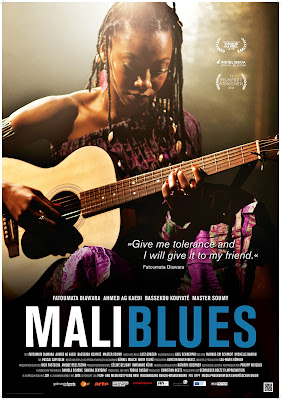Some believe Mali, and particularly Timbuktu, to be the
birthplace of the blues. Mali Blues (2016)
is the third significant account of the civil war in Northern Mali to appear in
recent years.
A conflict that started in 2012 as a liberation movement of
the Tuareg peoples, it was quickly taken over by jihadists including a splinter
al-Qaeda group who imposed strict Sharia law, particularly in the northern cities
of Timbuktu, Kidal and Gao. Driven out of the cities a year later by forces led
by the French military, the jihadists still roam across Northern Mali attacking
troops and attempting to impose their version of Sharia law on locals.
Abderrahmane Sissako’s Cannes winner Timbuktu (2015), told the story of a cattle herder, his wife and
their children as they became subjected to the absurd court judgements handed
down by the jihadists who had overrun that fabled city.
Charlie English’s The
Book Smugglers of Timbuktu, published in 2016, is a page-turning account of
the archivists and librarians who fought to save tens of thousands of medieval
manuscripts (many of them in private hands) from the al-Qaeda fanatics out to burn
them.
And now Mali Blues
(2016) bears witness to the jihadists’ attempts to ban Mali’s renowned musical
culture, internationally known for performers Salif Keita, Ali Farka Touré,
Tinariwen and Oumou Sangare among others.
Mali Blues
follows four performers – the Tuareg guitarist Ahmed Ag Kaedi, forced to leave
his home town of Kidal in the north when the jihadists burnt his equipment and
threatened to cut his fingers off; singer-songwriter-guitarist Fatoumata
Diawara who also acted in Sissako’s Timbuktu;
a streetwise rap singer Master Soumy; and the “praise” singer Bassékou Kouyaté
who, among other things, shows off a ngoni, an instrument he claims evolved
into the banjo.
Filmed mostly in the capital Bamako, Gregor leans heavily towards political and cultural material. Two musical sequences stand out. Fatoumata Diawara (who played six concerts in NSW in 2012) returns to her village to sing a song to the women about genital mutilation. Their subsequent discussion on the issue is both powerful and illuminating.
They told me they
do it in the morning
They do it with a
piece of iron
With a knife
Illness is on the
knife
Death is on the
knife
Pain is on the
knife
Terrible sickness
is on the knife
They cut it off
They cut the
blossom off
That made me into a
woman
Don’t cut it off
Mama
The blossom that
made us into women
They cut it off me
And Master Soumy, who delivers an arresting rap about the
plight of his religion:
Some spend their
day happy and having fun and laughing
But in Gao people
live in fear
What did they do to
God?
Some are joyful and
dance
But in Timbuktu
peoples guts are tied in knots
….
You who torture
people
Explain your Islam!
….
They make ruins of
homes
Courtyards into
holed calabashes
They say they fight
for God
But their pact is
with Satan
I’m shocked and
disgusted
My body hurts up
north
Kalashnikovs and
bombs
Explain your Islam!
Torture, rape,
thrashings
Explain your Islam!
Abuse and killings
Explain your Islam!


No comments:
Post a Comment
Note: only a member of this blog may post a comment.